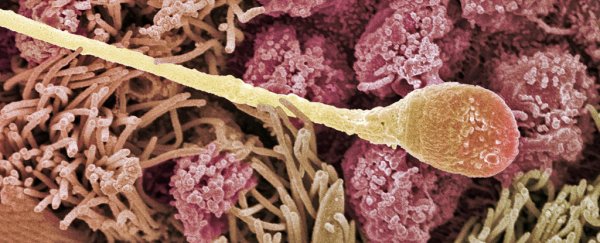Studies in mammals have shown that the 'memories' of various environmental effects – such as diet, weight, and stress – can be passed on from fathers to offspring, despite these effects not being coded for in the DNA sequences carried by sperm.
Thanks to a 2021 study, we have an explanation for how it's possible.
The story has much to do with epigenetics. Molecules that attach themselves to DNA can act like on-off switches that control which sections of DNA get used – but until 2021, we didn't know which of these molecules can carry the settings marked by a father's life experiences, to be incorporated into an embryo via sperm.
"The big breakthrough with this study is that it has identified a non-DNA-based means by which sperm remember a father's environment (diet) and transmit that information to the embryo," McGill University epigeneticist Sarah Kimmins said in 2021.
Using mice, epigeneticist Ariane Lismer and colleagues were able to demonstrate that the effects of a folate-deficient diet could be passed on by altering histone molecules in sperm. Simply put, histones are really basic proteins that DNA winds around for tangle-free storage.
In mammals, when male bodies build sperm, they throw out most of the histone spools, to allow for tighter packing.
But a small percentage still remains (1 percent in mice and 15 percent in humans), providing scaffolding for DNA in regions specific to sperm creation and function, metabolism, and embryo development – to allow the cellular mechanisms to make use of these DNA instructions.
Chemical modification of these histones – the most common form being methylation – is what allows or prevents the DNA to be 'read' so that it can be transcribed into protein products. Poor diet can cause these histones to change their methylation status.
This is why we hear about the importance of folate for women during pregnancy: A mother's folate helps stabilize DNA methylation in their young.
By feeding male mice a folate-deficient diet from the time they were weaned, the researchers were able to track the changes to histones from the male's sperm and in the resulting embryos. And indeed, sperm histone changes were also present in the developing embryo.
"No one has been able to track how those heritable environmental signatures are transmitted from the sperm to the embryo before," said Lismer in 2021.
The team also discovered these effects could be cumulative and lead to an increase in the severity of birth defects.
Interestingly, the birth defects seen in the mice, including underdevelopment at birth and spinal abnormalities, are well documented in folate-deficient human populations.
The researchers hope that expanding our knowledge of inheritance mechanisms will reveal additional ways to treat and prevent such conditions. But there is a lot more to work out before then.
"Our next steps will be to determine if these harmful changes induced in the sperm proteins (histones) can be repaired. We have exciting new work that suggests that this is indeed the case," said Kimmins.
This research was published in Developmental Cell.
A version of the article was first published in March 2021.
